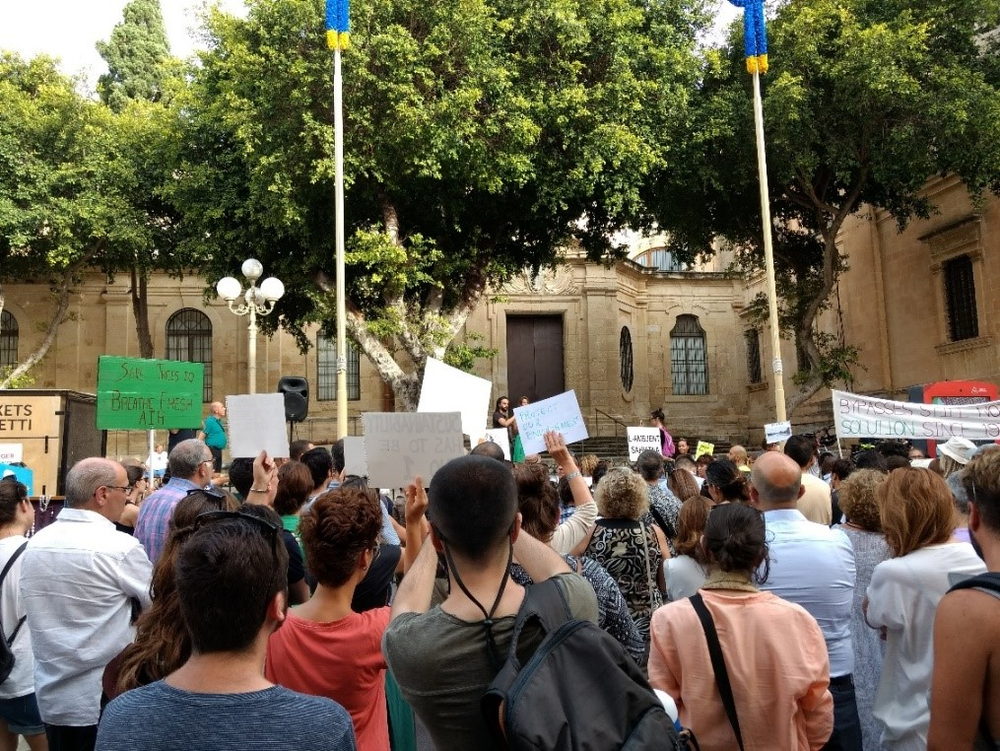Renaturing Malta through collaborations for nature-based solutions
by Mario Balzan, ReNature Coordinator
With an area of just 316 km2 and a population of more than 475,000, Malta is the smallest member country of the European Union. The island state has been moulded through human action since the first recorded human settlement more than 7000 years before present. Today, more than 30% of the land cover consists of built-up areas and more than 50% is considered as agricultural. However, Malta is currently undergoing a rapid economic growth, increased tourist influx, and strong immigration and urbanisation trends. More than 94.6% of the population is considered as living in urban areas (read more).
This context makes Malta an interesting case-study for the study of urban ecosystems and cultural landscapes. With more competition for space for urban and industrial development, the need to assess the availability to green infrastructure has become more pressing. How does accessibility to green infrastructure, and the benefits it provides to people, vary in space? What are the impacts on human well-being and do these affect one part of society more than another? These are some of the questions that researchers have been working on.
 Figure 1 - Valletta, the capital city of Malta and a UNESCO World Heritage Site, is located in an urban agglomeration characterised with a high population density and strong tourism and commercial development. Photo: Mario Balzan
Figure 1 - Valletta, the capital city of Malta and a UNESCO World Heritage Site, is located in an urban agglomeration characterised with a high population density and strong tourism and commercial development. Photo: Mario Balzan
A recent study has looked at the availability of green infrastructure and the actual use of the services leading to social, economic and environmental benefit (read more). This study found a strong gradient in terms of green infrastructure availability from rural to urban areas. And, as a consequence, the capacity of ecosystems to provide benefits to society is lower in urban centres. In contrast, research suggests an important contribution of urban green spaces leading to multiple benefits to society. These include the reduction of ambient temperatures through shading and evapotranspiration, opportunities for recreation, reduction of flooding by limiting stormwater runoff, and the removal of air pollutants by vegetation.
A recent study using the outdoor game Geocaching, described as the world’s largest treasure hunt, has shown the importance of these spaces for recreation (read more). Results from Malta indicate that the highest number of caches were placed and searched for in urban areas and that geocaching is strongly associated with the presence and accessibility of urban green infrastructure.
 Figure 2 - The Lower Barrakka Gardens in Valletta. A historical urban garden and a recreational and touristic site in the capital city. Photo: Mario Balzan
Figure 2 - The Lower Barrakka Gardens in Valletta. A historical urban garden and a recreational and touristic site in the capital city. Photo: Mario BalzanThe implication is that there is a strong need for land use planning to promote the use of nature-based solutions to develop the green infrastructure network in urban areas, and by doing so, significantly contributing to support biodiversity and ecosystem services flows leading to benefits to society. Nature–based solutions are inspired by nature, provide multiple benefits, help build resilience and bring biodiversity into cities and landscapes through adapted interventions.

Figure 3 - Hundreds of residents have recently gathered in Valletta in a demonstration in favour of the environment and the protection of trees and green spaces. Photo: Mario Balzan
The need for improved use of nature-based solutions also appears to be strongly felt by Maltese citizens, who were the most likely in the EU be in favour of the promotion and use of nature-based solutions. Malta was the EU member state with the highest fraction of citizens favouring urban greening (81%) measures.
Researchers at the Malta College of Arts, Science and Technology (MCAST) have seen this as an opportunity to launch a research initiative, which by working closely with policy-makers, businesses and stakeholders, will develop a research strategy and build a research and innovation network to advance the development and uptake of nature-based solutions.
These are some of the goals of the recently funded Horizon 2020 Twinning project ReNature (Promoting research excellence in nature-based solutions for innovation, sustainable economic growth and human well-being in Malta). During ReNature, Maltese researchers will collaborate with partners from Ireland, Italy, the United Kingdom and Bulgaria. This collaboration is expected to offer an opportunity to increase the institution and national research capacity within this sector, link up with existing initiatives and projects, develop a national research community with strong international collaborations, and to develop new practical solutions.
Through capacity-building and knowledge synthesis about nature’s benefits and nature-based solutions, and by developing a strong collaboration with policy and businesses, the ReNature researchers aim to foster a culture of evidence-based environmental decision-making and planning for human well-being. This ambitious project aims to make Malta a strong research and innovation player in the emerging field of nature-based solutions, thereby providing an opportunity to develop and test new technical and policy solutions in an urbanised island environment.
The Kick-Off meeting of the ReNature project will be held on the 25th of October at the Institute of Applied Sciences of the Malta College of Arts, Science and Technology. Follow us on twitter @ReNature_H2020 for more details and updated information about the ReNature events.
This project has received funding from the European Union’s Horizon 2020 research and innovation programme under grant agreement No 809988.